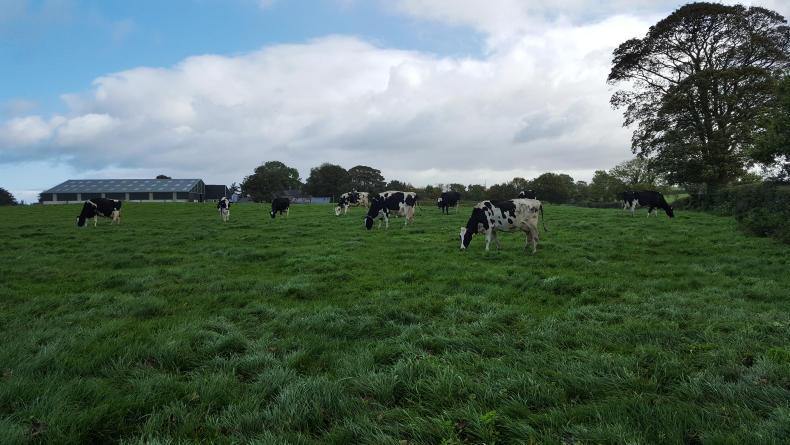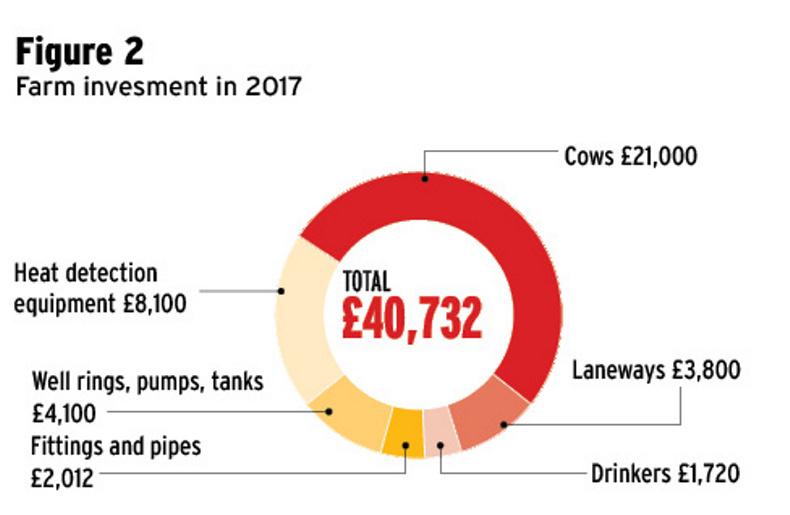Increased overall farm output and reduced production costs helped deliver a better financial performance for Nigel Corbett’s farm business in 2017.
Listen to a discussion of Nigel's achievements in our podcast below:
Total income from milk sales was £196,848 last year, up £69,665 on 2016 levels. Although Nigel’s average milk price was up by 8.6ppl in 2017 to 28.6ppl, the increase in milk sales is also down to an increase in cow numbers and stocking rate, as Table 1 outlines.
The milk output increase has been delivered while production costs have reduced on a per-cow or per-litre basis. Cost of production, excluding drawings, reduced by 0.9ppl in 2017 to 22.4ppl.
As Figure 1 shows, the main cost on the farm continues to be concentrates. Nigel reduced concentrates fed per cow from 2.18t/cow last year to 1.91t/cow in 2017, equating to a feed rate of 0.26kg/litre.

Total farm receipts (excluding CAP payments) equated to £224,061 last year. Drawings of £30,000 are assumed for all Dairylink programme farmers and when this is added to Nigel’s farm working expenses of £116,397, there is £77,664 available in 2017 for loan repayments, taxation and additional personal drawings.
Investment in recent years in a new milking parlour, cubicles and slurry storage on the farm means loan repayments are a channel for funds after working expenses are subtracted from farm receipts.
Investments
Increasing output is not without cost and Figure 2 shows that £40,372 was spent in 2017 on farm investments, ranging from purchasing cows to constructing laneways.
However, these investments will allow Nigel to sustainably increase output and reduce production costs in the future.
For example, by addressing soil fertility issues over the past three years, grass growth on the milking platform increased by 20% last year to 11.29t DM/ha. This allowed stocking rate to increase by 11%, while dairy cow concentrate feed levels per cow reduced by 12.4%.
Nigel paid for the investments outlined in Figure 2 through a five-year loan. This was done so that surplus cash generated in 2017 can be set aside for potential use in the next period of low milk prices.

Improving herd fertility has been a key part of improving the technical efficiency of Nigel’s farm.
Calving profile reduced from 32 weeks in 2015/16 to 18 weeks in 2017/18. This allows more cows to be open for AI at the start of the breeding season, meaning fertility improvements have a cumulative effect year on year. On Nigel’s farm, 75% of the herd were eligible for breeding on 1 December last year.
Achieving this has also not been without cost, with stock having to be purchased to replace cows that were calving outside the window and a pedometer system has also been installed to improve heat detection. However, improving herd fertility is a sound investment, as it means more productive cows are in the herd.
What next for Nigel Corbett?
The plan for my farm business is to continue to push production costs down, while maintaining current production levels and improving technical efficiency in the herd. The aim is to be profitable year after year, regardless of milk price.
Key to controlling costs is growing and utilising more grass. Initial investment in increasing grass growth so far has been in addressing soil fertility issues with targeted use of compound fertilisers and lime. I also spread the target chemical nitrogen rate of 210kg/ha last year.
On the utilisation side, constructing laneways and improving paddock layout has been key. The next steps for growth and utilisation are to reseed underperforming swards and complete the investment in grazing infrastructure.
Sire selection is a longer-term approach that we are applying to improve herd fertility and increase milk solids. Sires are being selected with breeding indices for milk volumes that are close to zero, but are high for fertility, protein and butterfat.
We have also begun investment in a private water supply by purchasing well rings, pumps and a tank this year. The plan is to pump water from a private well on the farm to remove the cost of mains water, which stood at £4,320 last year.
CAFRE Greenmount dairy open days
The dairy unit at CAFRE Greenmount near Antrim is to host open days for farmers next week on 24 and 25 January. Presentations will focus on heifer rearing, dry cow management, calving management and feed efficiency.
A key focus of the event will be the college’s 200-cow dairy herd, which has an average yield of 8,777 litres per cow per year from 2.7t of concentrates.
Tours of the dairy unit will start from 10.30am each day and will last two hours. Groups will leave every 20 minutes, with the last group due to leave each day at 1.30pm. A light lunch will be served after each tour.






 This is a subscriber-only article
This is a subscriber-only article












SHARING OPTIONS: